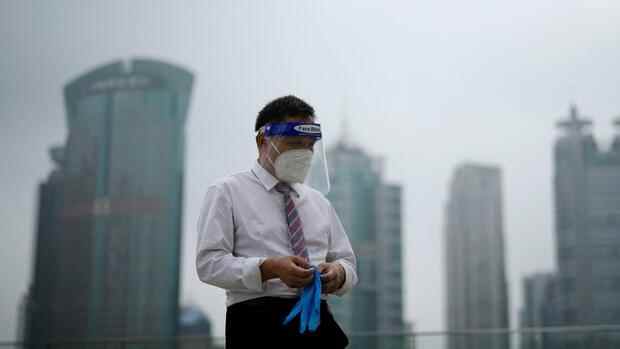Beijing Chinese state propaganda is in full swing this week following the easing of more than two months of draconian lockdowns on Shanghai. In a front-page report on Thursday, the Communist Party’s People’s Daily announced victory in the fight against the virus in the city of 25 million.
It has been shown once again, the newspaper said in an opinion piece, that “zero Covid” is the most appropriate strategy for China given the country’s aging population, relatively low vaccination rates for the elderly and children, and insufficient medical resources .
Since Wednesday, most of the more than 25 million inhabitants of the Chinese economic metropolis have been able to step out onto the streets again after more than two months in which they were only able to leave their homes in absolutely exceptional cases. Barricades around residential complexes and on the streets were partially dismantled, supermarkets reopened without restrictions.
However, despite the easing, the mood among business representatives is clouded. “On the streets it seems as if someone has flipped the switch: Everyone is outside, the shopkeepers are cleaning their sales rooms so that they can open again soon,” reports Bettina Schön-Behanzin, Vice President of the European Chamber of Commerce in China.
Top jobs of the day
Find the best jobs now and
be notified by email.
Schön-Behanzin lives in Shanghai and has been in lockdown for the past few weeks. However, there is an abnormal normality in European companies, she says.
“The companies are already preparing with security concepts that there could be a next lockdown,” says Schön-Behanzin. “It’s like the sword of Damocles — you never know when cases will blow up again and the city and businesses will go into lockdown again.”
End of strict lockdown in Shanghai
Many companies have sent their workers, who have been sleeping and working in the factories for weeks in the so-called “closed loop” system, home and replaced them with other employees in the production facility. But many continue to work under special precautions and divide the production facilities into zones to avoid a complete lockdown of the facilities if a case occurs.
New reports of neighborhood lockdowns
In fact, the first reports of neighborhoods in Shanghai being cordoned off again were already on Thursday because new cases had arisen. In some areas, residents were not allowed to leave their homes at all. And in the rest of the country, strict pandemic restrictions are still in force, putting pressure on the economy.
“The recurring lockdowns and travel restrictions are already having consequences,” reports Schön-Behanzin, “international companies are relocating their regional headquarters for Asia from Shanghai to other cities, such as Singapore.” No company will leave China completely, but the market is still growing too strong. “But new investments are no longer being made due to the uncertain situation.”
Globally, too, it will probably take some time before the after-effects of the harsh lockdowns in the economic metropolis of Shanghai and other parts of the country are overcome.
“We’re talking about long supply chains that have been disrupted for more than eight weeks, so it will take time for them to stabilize,” Eric Zheng, president of the American Chamber of Commerce in Shanghai, told Bloomberg.
The shutdown has been a “major test” for global supply chains, Zheng said, and while the government has been working to reduce transport bottlenecks, there are still restrictions on drivers entering or leaving the city for others driving provinces.
“It will take a few weeks for the logistics to be rebuilt,” said the delegate of German business, Maximilian Butek, in the eastern Chinese port metropolis of the German Press Agency. “It may be months before companies in Germany no longer feel anything.”
China wants to boost the sluggish economy
In recent weeks, following a drastic warning from Prime Minister Li Keqiang, the government and authorities in China have promised several measures to stimulate the economy. The Chinese Ministry of Finance announced on Thursday that it would speed up VAT refunds and make it easier for small businesses to participate in government procurement projects.
State banks are to provide 800 billion yuan (around 112 billion euros) for infrastructure projects. For its part, the Chinese central bank (PBOC) promised to use monetary policy to stimulate growth.
Economists warned, however, that the damage caused by the recurring closures and the drastic transport restrictions cannot be made up for quickly despite the measures.
Almost all economic indicators had pointed downwards in the past few months. As recently as Monday, the official May manufacturing and services PMIs were below 50 for the third month in a row – anything below that shows a contraction.
More: “We ran away like refugees” – Many Chinese want to leave their homeland.
